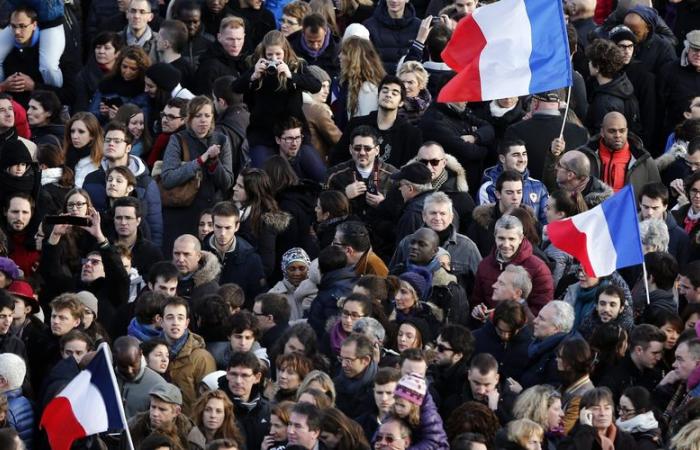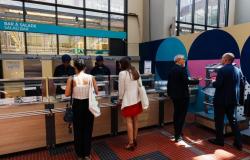
the essential
Nostalgia for the past, pessimism about the future, and yet… The latest study by BVA Xsight and the Jean Jaurès Foundation paints a chiaroscuro portrait of French society. A picture where collective fatigue, desire for social bonds and assumed contradictions mix. Decryption.
“It was better before.” The French hum this refrain in unison, according to the latest study by BVA Xsight and the Jean Jaurès Foundation, published Tuesday, December 3, which paints a chiaroscuro portrait of French society. Nearly 70% of them believe that life in France was better 20 years ago. A feeling that is particularly strong among 35-49 year olds (74%) and workers (77%). Only young people seem to escape this collective blues, with “only” 51% of 18-24 year olds sharing this declinist vision.
But the discomfort doesn't stop there. The French are convinced that the grass is greener elsewhere in Europe. Public services, healthcare system, education… On all these subjects, they judge the French situation to be worse than our neighbors. Only leisure and digital technology find favor in their eyes.
Generalized feeling of fatigue
This ambient gloom translates into a feeling of general fatigue. When asked to describe their state of mind, 48% of French people cite fatigue, far ahead of anger or frustration. An exhaustion that seems to result from a society in perpetual acceleration, where social bonds are weakening.
Because this is the heart of the problem: 58% of French people think that the links between users and public officials have weakened over the past 20 years. Same observation for neighborhood (55%) or intergenerational (54%) relationships. The family itself does not escape this perceived disintegration of the social fabric.
But the recognition of undeniable progress
Paradoxically, this dark vision coexists with the recognition of undeniable progress. The French welcome technical advances (76%), the increased ease of travel (62%) and even greater access to leisure and knowledge (50%). How can we explain this large gap between objective progress and subjective pessimism?
The key may be found in the tensions running through French society. On the one hand, the desire for maximum efficiency, a legacy of the digital revolution. On the other, the aspiration for more humanity and closeness. The French want everything, right away, but at the same time deplore the dehumanization of services. They demand personalized responses (84%) while demanding immediate solutions (88%).
These contradictory injunctions are observed in all areas. When it comes to health, 80% regret the lack of time for caregivers, but 76% do not want to wait at the doctor's office. On the environmental side, 86% defend small rail lines, but 65% prefer to take their car. As for consumption, 62% favor local shops, but 64% make price their first purchasing criterion.
A society torn between two models
These assumed paradoxes reveal a society torn between two models. On the one hand, a “customer-oriented company”, efficient but disembodied. On the other, a “binding society” which would reconnect with humanity and the collective. The French oscillate between these two poles, aware of their own contradictions.
This permanent tension partly explains the fatigue felt. We are in the middle of the ford, between two models of society. Constant adaptation to change exhausts bodies and minds. Digital technology, while it has brought undeniable progress, has also contributed to this dehumanization: 78% of French people believe that human contacts have become rarer in recent years.
Faced with this observation of a “society of absence” (absence of humans, of time, of solidarity), a deep aspiration for social bond emerges. When asked what is missing most in our country, 55% of French people spontaneously cite solidarity between people. The words “proximity” and “solidarity” are also perceived very positively, particularly by the younger generations.
The Olympic Games interlude
The Paris 2024 Olympic Games offered a glimpse of this much-desired society of connection. For a few weeks, the increased human presence in public space created an enchanted parenthesis, like a counterpoint to the society of habitual absence. This experience rekindled the desire for proximity and solidarity.
However, it is not a question of rejecting outright the achievements of digital technology, perceived positively by 44% of French people. The challenge is rather to find a fair balance, by rehabilitating the traditional actors of social ties: local traders, pharmacists, postmen, social workers, etc.
A new model to invent
A new model of society therefore remains to be invented, combining the contributions of digital technology and the need for human relations. Between dematerialization and rehumanization, a middle path must be found to respond to the contradictory aspirations of the French. Because if the nostalgia for the past is strong, the desire to move forward does not weaken.
This study ultimately reveals a France in search of itself, torn between its contradictions but aware of its challenges. A tired society, certainly, but which has not given up on reinventing itself. It will undoubtedly be a long road to reconnect in a fragmented society. But is it not precisely in this common aspiration for more humanity that, paradoxically, a new “common” is taking shape for the France of tomorrow?





